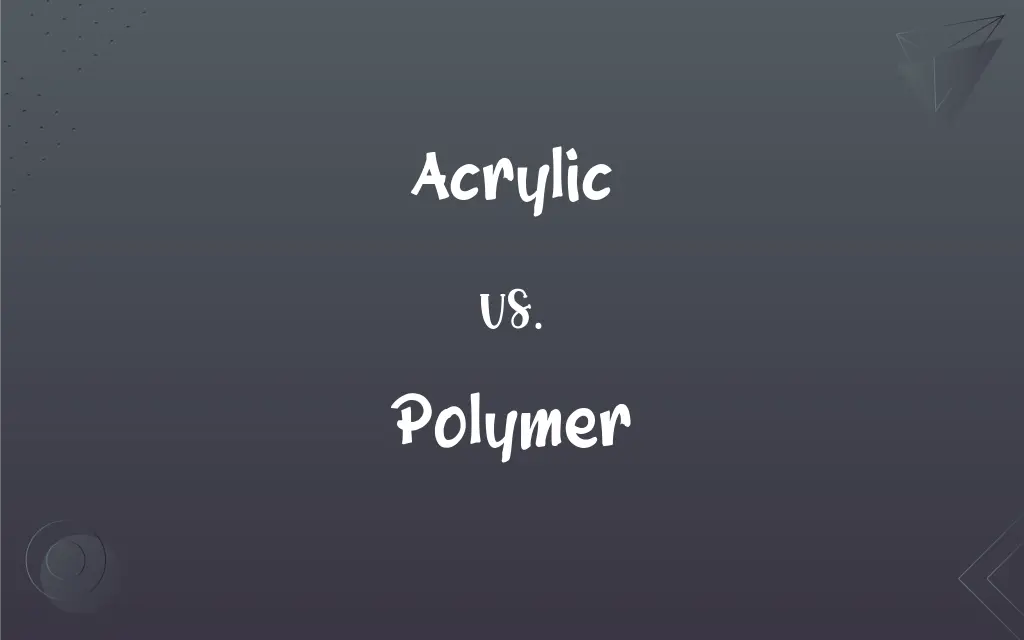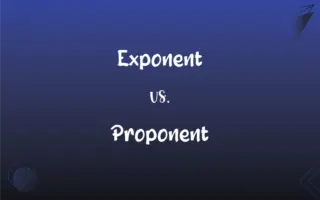Acrylic vs. Polymer: What's the Difference?
Edited by Aimie Carlson || By Janet White || Updated on October 5, 2023
Acrylic is a type of synthetic resin used in various materials and applications, often as a paint or plastic. Polymer is a broader term for large molecules made up of repeated subunits, which can include acrylic but also many other substances.

Key Differences
Acrylic is a specific type of polymer made from the polymerization of esters. It is commonly used in paints, plastics, and other materials. Polymer, on the other hand, is a broad term that describes large molecules composed of repeating subunits. Polymers can be natural like DNA or synthetic like polyester.
Acrylic tends to have specific uses, often in the form of sheets, paints, or fabrics. It is popular for its lightweight and transparent properties. Polymer is a much broader category that encompasses a wide range of materials, including plastics, resins, and even biological substances like proteins and DNA.
Grammatically, both acrylic and polymer function as nouns. However, "acrylic" can often be used as an adjective to describe materials that contain acrylic, such as "acrylic paint" or "acrylic fiber." "Polymer," while generally a noun, rarely serves as an adjective and is usually described by other adjectives like "synthetic polymer" or "natural polymer."
In summary, acrylic is a type of polymer with specific applications and characteristics. Polymer is a more general term encompassing a vast range of substances made from repeated molecular units. The former is a subset of the latter, but both have unique properties and applications.
Comparison Chart
Scope
Specific type of polymer
Broad term for large molecules
ADVERTISEMENT
Uses
Paints, plastics, fabrics
Various, including biology
Material Properties
Lightweight, transparent
Varies widely
Grammatical Role
Noun, sometimes an adjective
Primarily a noun
Biological Occurrence
Synthetic
Can be synthetic or natural
Acrylic and Polymer Definitions
Acrylic
Art medium
He prefers using acrylic for his artwork.
ADVERTISEMENT
Polymer
Repeating units
A polymer is made of monomers.
Acrylic
Synthetic resin
Acrylic is often used in paints.
Polymer
Material science
Polymers are studied in material science.
Acrylic
Fabric material
This sweater is made of acrylic.
Polymer
Biological role
Proteins are polymers with important functions.
Acrylic
An acrylic resin.
Polymer
Large molecules
DNA is a type of polymer.
Acrylic
A paint containing acrylic resin.
Polymer
Any of numerous natural and synthetic compounds of usually high molecular weight consisting of up to millions of repeated linked units, each a relatively light and simple molecule.
Acrylic
A painting done in acrylic resin.
Polymer
(organic chemistry) A long or larger molecule consisting of a chain or network of many repeating units, formed by chemically bonding together many identical or similar small molecules called monomers. A polymer is formed by polymerization, the joining of many monomer molecules.
Acrylic
Any of numerous synthetic fibers polymerized from acrylonitrile.
Polymer
A material consisting of such polymer molecules.
Acrylic
(organic chemistry) Derived from acrylic acid or acrylonitrile.
Polymer
Any one of two or more substances related to each other by polymerism; specifically, a substance produced from another substance by chemical polymerization.
Acrylic
Containing an acrylic resin.
Polymer
A naturally occurring or synthetic compound consisting of large molecules made up of a linked series of repeated simple monomers
Acrylic
(organic chemistry) An acrylic resin.
Polymer
Synthetic material
Nylon is a synthetic polymer.
Acrylic
(painting) A paint containing an acrylic resin.
When it comes to painting, I prefer using acrylics as my medium.
Acrylic
A painting executed using such a paint.
Acrylic
A thick sheet of plastic.
Acrylic
A liquid coating system based on an acrylic resin.
Acrylic
Of or containing acryl, the hypothetical radical of which acrolein is the hydride; as, acrylic acid. The characteristic residue in an acrylic compound is the carbonyl group attached directly to an ethylenic carbon.
Acrylic
Same as acrylic resin.
Acrylic
Same as acrylic fiber.
Acrylic
A paint in which the pigment is suspended in a solution of an acrylic resin, which dries to a hard film on exposure to air.
Acrylic
A painting made using an acrylic paint.
Acrylic
Polymerized from acrylonitrile
Acrylic
A glassy thermoplastic; can be cast and molded or used in coatings and adhesives
Acrylic
Used especially by artists
Acrylic
A synthetic fabric
Acrylic
Type of plastic
Acrylic sheets are lightweight.
Acrylic
Transparent material
The aquarium is made of acrylic glass.
FAQs
What is a polymer?
A polymer is a large molecule made of repeating subunits.
Are all acrylics synthetic?
Generally, acrylic is synthetic.
Are polymers recyclable?
Some polymers are recyclable, depending on the type.
Can polymers be natural?
Yes, polymers can be both natural and synthetic.
Is acrylic toxic?
Generally, acrylic is considered non-toxic but can emit fumes.
What is acrylic commonly used for?
Acrylic is commonly used in paints, plastics, and fabrics.
Is acrylic water-resistant?
Yes, acrylic is generally water-resistant.
What are biopolymers?
Biopolymers are natural polymers like DNA or proteins.
Can acrylic be used as an adhesive?
Yes, acrylic can be formulated as an adhesive.
Is acrylic a polymer?
Yes, acrylic is a specific type of polymer.
Is acrylic paint water-based?
Acrylic paint is generally water-based.
Are all polymers plastics?
No, not all polymers are plastics; they can also be biological.
How are polymers made?
Polymers are made through polymerization, linking monomers together.
About Author
Written by
Janet WhiteJanet White has been an esteemed writer and blogger for Difference Wiki. Holding a Master's degree in Science and Medical Journalism from the prestigious Boston University, she has consistently demonstrated her expertise and passion for her field. When she's not immersed in her work, Janet relishes her time exercising, delving into a good book, and cherishing moments with friends and family.
Edited by
Aimie CarlsonAimie Carlson, holding a master's degree in English literature, is a fervent English language enthusiast. She lends her writing talents to Difference Wiki, a prominent website that specializes in comparisons, offering readers insightful analyses that both captivate and inform.































































